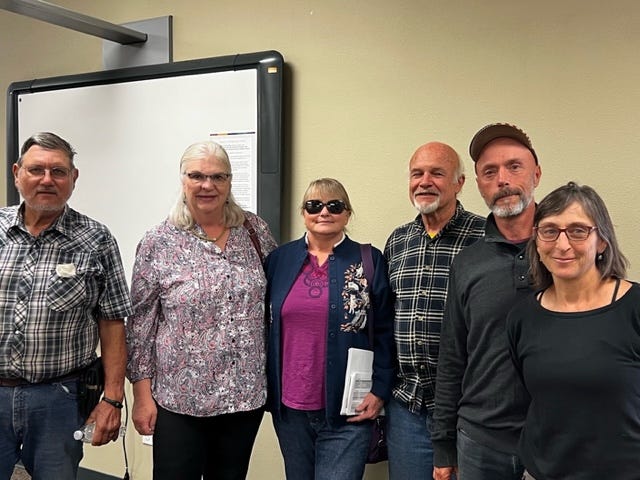This year on November 5th, I will be doing my third stint as a poll worker in my rural town of Lovilia, Iowa. Working the polls is an often overlooked part of our democracy, a role many more should consider for themselves, particularly if they are concerned about how elections work. Understanding the process is a natural outcome of participation.
Poll worker training for this election happened a few days ago, and like one big democratic family, the group of mostly retirees and grandparents (many of whom have been poll workers for a decade or more) reviewed again how to properly serve the public in the voting process. And while there are differences of opinions—some were concerned about “illegals” voting, others wanted to know why voters have to choose a gender--we are all united in our belief in the American dream, one where the populace peacefully and respectfully chooses a new leader.
One of the things covered in training were the rules for voting--which are complicated and vary by state.
36 states, including Iowa, require presenting identification (not necessarily with a photo), while other states like California check signatures or other personal information when people arrive at the polls. In California, I had to vote provisionally (provisional votes go into a special pile to be considered separately) when I neglected to fill out my absentee ballot--here in Iowa, I could have surrendered my absentee ballot by bringing it to my polling place and then been allowed to vote as everyone else does. In Iowa, an equal number of Democrats and Republicans must work at each polling station (Independents and other parties are welcome too)—New York law requires the same.
It's a lot to learn, but luckily the computerized system is set up so there is very little opportunity for mistakes. Prompts on the computer screen remind workers what to ask and in what order (“Please state your name, address and birthdate…”) and guide us through step-by-step when handling irregularities. If a person has changed their name, for example, or moved to a new address but did not update their license, there is a process to update their information or to register them to vote the day of the election (all legal in Iowa).
Of course, nothing we humans do is foolproof and there will likely be more than one mistake made in the election this year in the United States. But mistakes are not the same as conspiracies, and it saddens and concerns me that this election is marred by so much suspicion, suspicion of everything from the poll workers and the computer systems to the voters and the election officials—suspicion of each other.
It’s enough to make countries who hate our democracy rub their hands with glee to think that neighbor is pitted against neighbor, all while our environment, the economy, and ultimately our democracy, suffers. Let’s instead turn off the TV, the Instagram feeds, and the Facebook posts aimed at tearing us apart this election season, and work together to make democracy a reality, together.
Check out these Iowa Writer’s Collaborative Highlights:
In the Iowa Mercury Douglas Burns writes about fellow Iowa Writers' Collaborative Nik Heftman's documentary. "The Negro Artist" will be shown at numerous theaters and locations around the Des Moines metro area in coming months. It's also showing at 7 p.m., Dec. 11 at Film Scene in Iowa City. For showtimes in Iowa and across the nation please visit The Seven Times website
Last week, Cheryl Tevis tackles the alarming increase in new cancers in Iowa, and examines why agriculture seems to be in the hot seat regarding this trend.
And don’t miss IWC writer and author Rachelle Chase’s book club! It is fascinating.





Thanks for doing this important work, Beth, and for explaining (again) how carefully the system is designed. Wishing you an uneventful November 5.
Thank you Beth for laying out how poll workers are trained and on the same page for a free and fair election. Your job will be a bit harder given the list that Secretary of State Pate sent out to all the counties that will have to be checked. If there is a discrepancy then a provisional ballot will need to be filled out. I'm wondering as Ed Tibbets wrote in https://edtibbetts.substack.com/p/iowas-suspicious-voters if the list was really necessary.